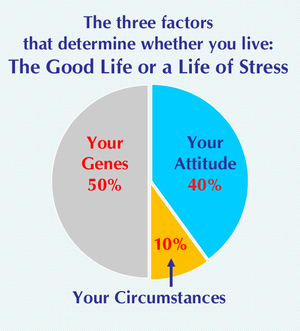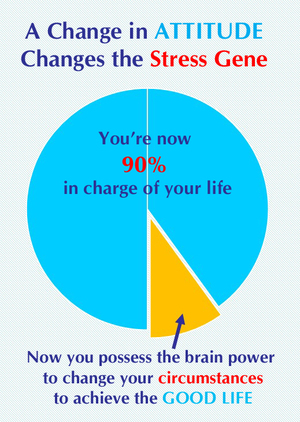
There are people in the world who, outwardly, seem to be doing quite well, and yet inwardly are living an unhappy life encumbered by stress, health problems, and family dysfunction. Conversely, there are people who are far from wealthy, yet they're joyful, at peace, and buoyed by the love they give and receive. 
Then there's those I call the Lucky Few who are living the Good Life, which is a life of being well and doing well on the way to flourishing. These folks have managed to secure the wealth, health, and love we all desire.
Was it good luck that bestows these blessings or something else that the rest of us have failed to see?
Well, science researched this very question and discovered three essential factors [1] that combine to either thwart or support your efforts to achieve the Good Life. It turns out that the first two factors actually relate to luck, but the third factor is the one that makes the biggest impact. It can turn bad luck into good, propelling your life forward, and this factor is completely under your control.
1. The first factor that determines your quality of life is genetics. This relates to the type of stress gene you inherit, and it accounts for 50 percent of why you are either flourishing, or stressed and struggling. 
If you're lucky and the stress gene you inherited is turned-down low, your brain is more likely to maximize the analytical, emotional, and social intelligence that enables you to move through life's ups and downs in a creative manner, and progress forward toward achieving your goals.
Conversely, if the stress gene is turned up high (as it is with many Millennials and Gen Xers), you're more likely to over-react to stressors, struggle with negative emotions, and effort against periodic drops in your IQ caused by stress hormones. This leads to making bad decisions, the likelihood of marital problems and financial distress, an inability to sustain peak performance, and susceptibility to a long list of stress-related health problems.
2. The second factor in determining whether you live a life of stress or a happy, rewarding life is your circumstances, meaning your financial situation, your job, health problems, and the quality of your close relationships. But research has found that circumstances only account for 10 percent of what raises or lowers your quality of life. The famous Brickman study [2] of lottery winners and people paralyzed in traumatic accidents substantiated this. The study found that ultimately people who won the lottery were not happier because of their good fortune, and people who became paralyzed were not unhappier because of their misfortune.
In as little as three months, the elation of lottery winners disappeared as they grew accustomed to being wealthy. Equally, the initial shock and despair paraplegics felt eventually resolved as they adjusted to their injury. Similar research found that the blind, the developmentally disabled and the handicapped are no less happy than other people.
Yet most people still believe that a change in circumstances is what will put an end to a stressful, disappointing, and unhappy life, despite the research that shows it doesn't make a big difference.
 3. The change that makes the biggest difference is a change in your attitude. This was shown in the study of paraplegics I cited above. Their misfortune challenged them to elevate their attitude, and as a result they began to experience more joy from life's simple, every day pleasures. It turns out that attitude accounts for 40 percent of what either perpetuates a stressful existence or actualizes a higher quality of mind that empowers a higher quality of life. How?
3. The change that makes the biggest difference is a change in your attitude. This was shown in the study of paraplegics I cited above. Their misfortune challenged them to elevate their attitude, and as a result they began to experience more joy from life's simple, every day pleasures. It turns out that attitude accounts for 40 percent of what either perpetuates a stressful existence or actualizes a higher quality of mind that empowers a higher quality of life. How?
A positive shift in attitude turns down the volume on your stress gene, [3] elevating the brain function that maximizes IQ, increases the capacity to learn, stimulates the creative insight that solves problems, and resets the brain's emotional set point to positive, inspiring the optimism that fuels your passion.
A positive shift in attitude can produce an exponential shift in all three factors, changing the odds in your favor. You're now 90 percent in charge of your life. When the stress gene stops working against you, your brain starts working for you, applying the full measure of your intelligence. You are now on your way to becoming master of your own destiny.
Science has provided a number of proven methods that strengthen our capacity to relate to life through a calmer, more creative, more optimistic attitude. In my new book, The End of Stress, I've organized 20 of these approaches into a program that can open the way to a higher quality of life.